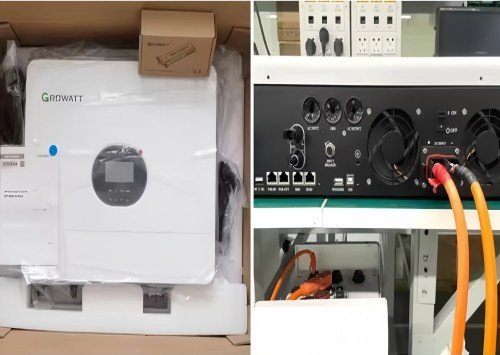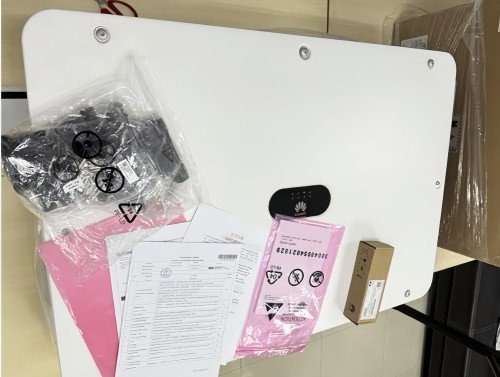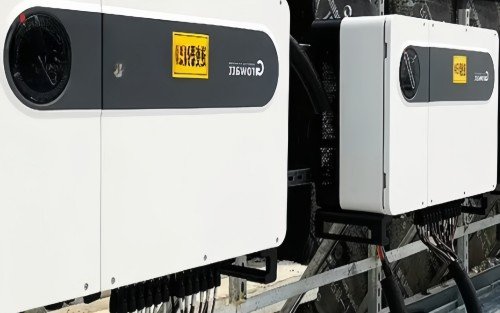
Huawei inverter installation
When choosing an inverter for your solar energy system, Huawei and Growatt are two leading brands that offer innovative technologies, efficiency, and reliability. Both brands have built a reputation for high-quality products, but they cater to slightly different needs. In this article, we will compare Huawei and Growatt inverters (specifically their larger 100kW models) across key criteria such as efficiency, battery compatibility, reliability, and performance in residential vs. commercial applications to help you decide which is the best fit for your solar setup.
Huawei and Growatt both offer strong inverter solutions, but which one is the better choice for your specific requirements? Let’s explore their differences and strengths.
How Do Huawei and Growatt Inverters Compare in Terms of Efficiency?
Efficiency is a crucial factor in determining how much solar energy is converted into usable electricity. Higher efficiency means more energy is harnessed, leading to greater energy savings. Let’s compare the efficiency of Huawei and Growatt inverters, focusing on their 100kW models, to see which brand delivers better energy conversion.
Let’s evaluate the efficiency of Huawei and Growatt’s larger 100kW inverters and see which one provides better energy conversion.

Worker in front of equipment
Huawei vs Growatt: Efficiency Comparison (100kW Models)
| Inverter Model | Huawei SUN2000-100KTL | Growatt 100KTL |
|---|---|---|
| Efficiency | 98.8% | 98.6% |
| Max Output Power | 100kW | 100kW |
| MPPT (Maximum Power Point Tracking) | 4 MPPTs | 4 MPPTs |
| Operating Temperature Range | -25°C to +60°C | -25°C to +60°C |
| Maximum Input Voltage | 1100V | 1100V |
-
Efficiency:
- Huawei: The Huawei SUN2000-100KTL inverter offers an impressive efficiency of 98.8%, which ensures that more energy from your solar panels is converted into usable electricity. This is ideal for maximizing energy savings, especially in large commercial installations inverter efficiency1.
- Growatt: The Growatt 100KTL inverter provides an efficiency of 98.6%, slightly lower than Huawei’s. While still excellent, it means Huawei may offer slightly higher energy conversion and, ultimately, better performance in large-scale setups energy conversion2.
-
MPPT:
- Both Huawei and Growatt 100kW models feature 4 MPPTs, allowing each solar panel string to operate at its optimal power point, even in conditions with shading or varying panel orientations MPPT technology3.
Conclusion: Huawei offers a slightly higher efficiency (98.8%) compared to Growatt’s 98.6%. If maximizing energy conversion is a priority for your large-scale system, Huawei has a small edge in this category.
How Do Huawei and Growatt Inverters Compare in Battery Compatibility?
Battery compatibility is crucial for energy storage systems, especially when pairing an inverter with a home or commercial energy storage solution. Let’s compare how Huawei and Growatt inverters integrate with various battery types, focusing on their 100kW models.
Let’s compare the battery compatibility of Huawei and Growatt’s 100kW inverters for efficient energy storage integration.

Growatt inverter front and rear
Huawei vs Growatt: Battery Compatibility Comparison
| Inverter Model | Huawei SUN2000-100KTL | Growatt 100KTL |
|---|---|---|
| Battery Compatibility | Huawei FusionStorage (Li-ion) | LiFePO4, LFP, and other third-party batteries |
| Battery Integration | Seamless integration with FusionStorage | Broad compatibility with third-party batteries |
| Battery Management | Advanced battery management system | Standard battery management system |
-
Huawei: Huawei inverters are optimized for use with their FusionStorage Li-ion batteries, providing seamless integration with excellent performance. Huawei’s advanced battery management system ensures that energy storage is efficient and long-lasting, making it ideal for large-scale hybrid systems battery management4.
-
Growatt: Growatt inverters are compatible with a range of battery types, including LiFePO4, LFP, and other third-party batteries. This makes Growatt more flexible when choosing a battery system, allowing you to use a variety of energy storage options energy storage solutions5.
Conclusion: Huawei offers better integration with its FusionStorage system, providing a seamless and highly efficient energy storage solution. However, Growatt offers broader compatibility with a variety of third-party batteries, giving you more options for battery selection.
Which Brand Offers Better Reliability and Durability for Long-Term Use?
Reliability and durability are key factors when selecting an inverter for long-term use. An inverter that performs well for many years without frequent repairs is essential for ensuring your solar system remains cost-effective over time.
Let’s compare the reliability and durability of Huawei and Growatt 100kW inverters to determine which brand provides the best long-term performance.

Huawei inverter and accessories
Huawei vs Growatt: Reliability and Durability Comparison
| Inverter Model | Huawei SUN2000-100KTL | Growatt 100KTL |
|---|---|---|
| Warranty | 5–10 years | 5–10 years |
| MTTF (Mean Time to Failure) | 30+ years | 25+ years |
| Cooling System | Smart cooling system | Integrated cooling system |
| IP Rating | IP65 | IP65 |
-
Warranty:
- Both Huawei and Growatt offer similar warranty periods of 5 to 10 years, ensuring that you’re covered in case of any issues with the inverter.
-
Reliability:
- Huawei: Huawei is renowned for producing highly reliable inverters. Their smart cooling system helps prevent overheating, and the advanced battery management system ensures long-term operation without significant degradation.
- Growatt: Growatt inverters are also reliable and durable. While they do not have the same smart cooling technology as Huawei, they still perform well in both residential and commercial systems.
-
Cooling:
- Huawei: Huawei’s smart cooling system dynamically adjusts to temperature changes, preventing overheating and ensuring optimal performance under heavy loads.
- Growatt: Growatt inverters come with an integrated cooling system that ensures efficient heat dissipation, although it may not be as advanced as Huawei’s.
Conclusion: Huawei’s advanced cooling system and longer Mean Time to Failure (MTTF) make it a more durable and reliable choice for long-term use, especially in harsh operating conditions. Growatt is also reliable but may not perform as well in extreme environments.
How Do Huawei and Growatt Inverters Perform in Residential vs. Commercial Applications?
The performance of an inverter can vary depending on the size and type of installation. Some inverters are better suited for residential use, while others are designed to handle larger commercial systems. Let’s compare how Huawei and Growatt inverters perform in both types of installations, focusing on their 100kW models.
Let’s evaluate the suitability of Huawei and Growatt inverters for residential vs. commercial applications.

Inverters installed on rack
Huawei vs Growatt: Performance in Residential vs. Commercial Applications
-
Residential Systems:
- Huawei: While Huawei inverters are excellent for large-scale commercial applications, their 100kW models can be used in large residential systems that require high capacity. However, they are more commonly found in larger commercial installations.
- Growatt: Growatt inverters are also suitable for residential applications, particularly in systems that require good performance but at a lower cost. While their 100kW model can be used in larger homes, they are better suited for medium to large commercial systems.
-
Commercial Systems:
- Huawei: Huawei inverters excel in commercial applications, especially those that require high scalability and integration with energy storage systems. Their high efficiency, smart cooling system6, and advanced management features make them perfect for large commercial projects.
- Growatt: Growatt’s 100kW inverter is ideal for medium to large commercial systems, offering good efficiency and a competitive price point. While it doesn’t have the same level of smart features as Huawei, it still offers great value for commercial users.
-
Scalability:
- Huawei: Huawei’s inverters are highly scalable, making them ideal for very large commercial installations that require a high degree of integration with energy storage and other components. Learn more about inverter scalability7 to understand how this feature benefits large-scale solar systems.
- Growatt: Growatt offers good scalability for commercial systems, though it may require additional units for larger setups compared to Huawei’s more robust offerings.
Conclusion: Huawei is better suited for large-scale commercial installations, thanks to its scalability, advanced features, and higher efficiency. Growatt is ideal for smaller to medium commercial systems and residential applications, offering great value for the price.
Conclusion
Both Huawei and Growatt offer excellent inverters with high efficiency, solid reliability, and good performance. Huawei stands out for its higher efficiency, advanced cooling system, and seamless integration with energy storage solutions, making it the better choice for large-scale commercial installations. Growatt, on the other hand, offers great value for money and is ideal for residential and smaller commercial setups.
Your choice between Huawei and Growatt will depend on your system size, budget, and desired features. If you prioritize cutting-edge technology, higher efficiency, and long-term durability, Huawei is the better option. If you’re looking for a more affordable inverter that still provides excellent performance, Growatt offers great value for money.
-
What is inverter efficiency?
Learn how inverter efficiency impacts the conversion of solar energy into usable electricity. ↩ -
What is energy conversion in solar inverters?
Explore how energy conversion plays a key role in the performance of solar inverters. ↩ -
What is MPPT technology?
Find out how MPPT technology helps maximize energy harvest from solar panels under varying conditions. ↩ -
What is battery management?
Learn how advanced battery management systems optimize the lifespan and performance of energy storage systems. ↩ -
What are energy storage solutions?
Explore the different types of energy storage systems and how they integrate with solar inverters. ↩ -
Smart cooling systems are crucial for preventing overheating in solar inverters. Learn how these systems enhance inverter longevity and efficiency. ↩
-
Inverters must be able to scale to meet the demands of larger systems. Explore how scalability impacts performance and long-term savings. ↩



